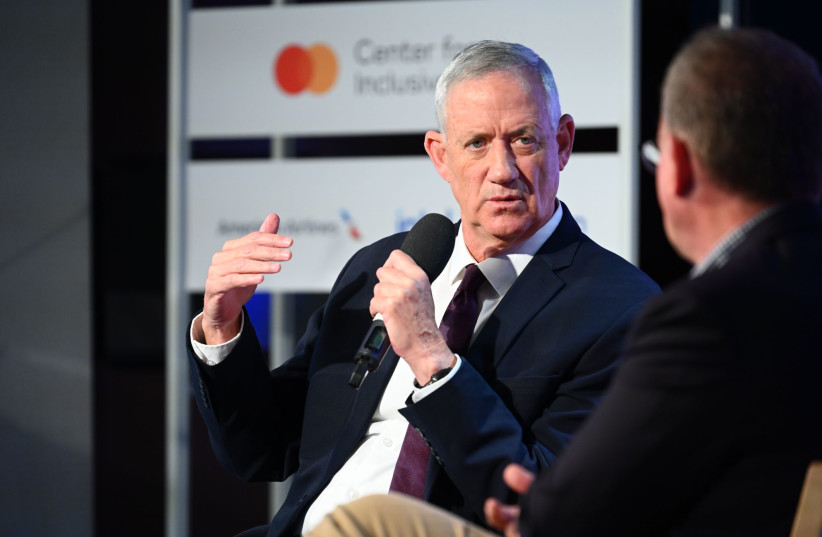Benny Gantz spoke at the Aspen Security Forum and was interviewed by The Atlantic’s Editor-in-Chief Jeffry Goldberg.

War against Iran should only be a matter of last resort, Defense Minister Benny Gantz said on Thursday, adding that he hoped the United States would support such a step if necessary.
“Should we jump to a war at the first opportunity we have, no,” Gantz said at the Aspen Security Forum, doing a public interview by The Atlantic’s Editor-in-Chief Jeffry Goldberg. The interview focuses on regional issues, including the Abraham Accords and Iran.
Goldberg had asked him if Israel was “prepared to confront Iran alone.”
Last case resort
“Should we be able to conduct military operations to prevent it [a nuclear Iran] if needed, the answer is ‘yes.’ Are we building the ability [for war], ‘yes.’ Should we use it as a last case, yes, and I hope that we will get US support,” Gantz said.
When it came to halting a nuclear Iran the world and the region should stop it, Gantz said.
“We as the Israeli government, as leaders of the Jewish country have a historical responsibility to make sure that this [a nuclear] doesn’t happen,” Gantz said.
Israel is uniquely threatened by Iran, but the larger region has also felt the impact of that danger, Gantz said, adding that the United Arab Emirates and Saudi Arabia were suffering more than Israel from Tehran’s actions.
Gantz reflected on the way that the Abraham Accords under whose rubric Israeli normalized ties with the UAE, Bahrain and Morocco, had also allowed for a united front on many issues including against Iran.
“The Abraham Accords enables us to expand our relations [with regional partners] in security aspects, in business to business [frameworks], organizations to organizations, and people to people.
“And of course, we are creating a regional architecture for defense,” Gantz said.
There is a united front on maintaining freedom of navigation and trade as well as on aerial and cyber defense, Gantz said.
“Since the signing of the Abraham Accords, Israel has participated in hundreds of meetings and discussions with regional partners and participated in at least 10 multinational exercises,” he added.
“Since the signing of the Accords, there have been hundreds of meetings and discussions with regional partners, and Israel has participated in at least 10 multinational exercises with regional partners,” Gantz said.
The shift in which the United States placed Israel in its regional CENTCOM group also helped strengthen a strategic umbrella under which the Jewish state can operate, Gantz said.
The Defense Minister recalled that Israel’s new relationship in the region was the direct result of the decision it took to suspend plans to apply sovereignty to West Bank settlements.
Gantz touted his position early on against such annexation. He has been a proponent of sovereignty only in the context of negotiations.
“I am very happy that I blocked the threat of annexation of Judea and Samaria. If we were to have annexed those areas I don’t think we could have moved forward with the Abraham Accords,” Gantz said.
The Abraham Accords symbolize the acceptance of Israel as part of the Middle East, he explained. That Accord and Israel’s new relationship with the region can be used “to strengthen the Palestinian Authority and promote confidence-building measures,” Gantz said.
This would include, he said, financial investments by Gulf states in the PA.
Gantz recalled that he has met with PA President Mahmoud Abbas three times and is the official in the Israeli government responsible for confidence-building measures to help improve day-to-day life for the Palestinians.
There have been 30 such measures, Gantz said, but he did not elaborate as to what those steps had been.
“From a Jewish, Zionist, and democratic perspective, I would like to see a better future between us and the Palestinians and that includes separating from the Palestinians,” Gantz said.
He explained that down the road there had to be a “permanent arrangement between the Palestinians and us and everyone can take his own words for that description.”
Gantz did not speak of two states as Prime Minister Yair Lapid has done. Instead, the Defense Minister spoke of “a two-entity situation” a phrase he has used in the past, including at the Munich Security Conference.
When speaking about the November elections in Israel, Gantz spoke of himself in a way that made it clear that he viewed himself as a contender for the job of prime minister, even though polls at present have him behind Lapid and former prime minister Benjamin Netanyahu.
“My plan is to build a wide unity government with all segments of Israeli society, to exclude the extreme edges,” Gantz said.
“Increasing unity within the Israeli society is part of the national resilience,” he said.
“I exclude no one and the difference between me and others is that no one excludes me,” he said.
Content retrieved from: https://www.jpost.com/middle-east/article-712790.
